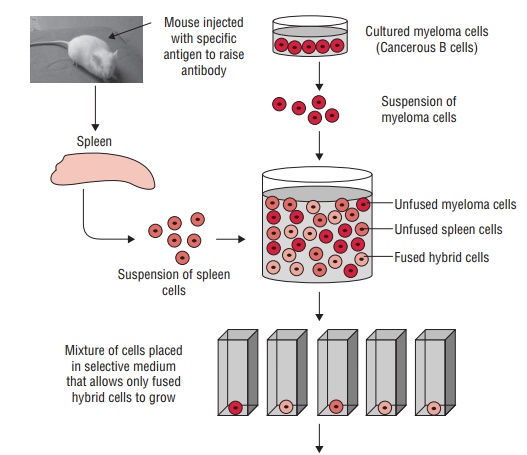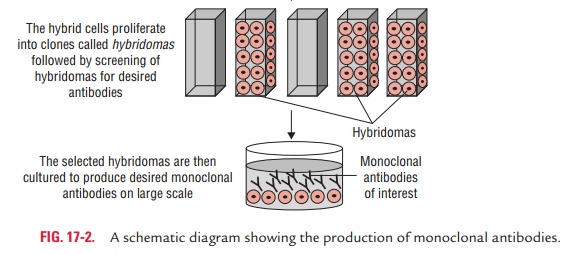Chapter: Microbiology and Immunology: Immune Response
Monoclonal Antibodies and Method of production
Monoclonal Antibodies
Antibodies that arise from a single clone of cells (e.g., myeloma)
are homogenous and are called monoclonal antibodies. For example, in multiple
myeloma, antibodies are produced by a single clone of plasma cells against a
single antigenic determi-nant, and hence antibodies are monoclonal. The
monoclonal antibodies differ from polyclonal antibodies, which are
heter-ologous and are formed by several different clones of plasma cells in
response to antigen.
◗ Method
of production of monoclonal antibodies
Kohler and Milstein (1975) were the first to describe a method for
production of monoclonal antibodies against a desired antigen for which they
were awarded Nobel Prize in 1984. Monoclonal antibodies are produced by fusion
of myeloma cells with antibody-producing cells, resulting in production of
hybridomas. Such hybridomas produce virtually unlimited quantities of
antibodies that are useful in research and diag-nostics. In this procedure,
mouse splenic lymphocytes are first fused with mouse myeloma cells to produce
hybrid cells or hybridomas. Myeloma cell provides the hybrid cell immortality,
whereas splenic plasma cell provides the antibody-producing
capacity. These hybridomas can be maintained indefinitely in culture and
continue to produce monoclonal antibodies. Hybridoma cells are prepared in
following ways (Fig. 17-2)


·
First, an animal (e.g., mouse) is immunized with the antigen of
interest.
· Spleen cells (lymphocytes) are then fused with
mouse myeloma cells and grown in culture, which are deficient in the enzyme
hypoxanthine phosphoribosyl transferase (HPRT).
·
Fusion of the cells is facilitated by addition of certain
chemi-cals, such as polyethylene glycol. The fused cells are grown in a special
culture medium (HAT medium) that supports the growth of the fused hybrid cells
but not of the parent cells.
·
Finally, the resulting clones of cells are screened for the
production of antibody to the antigen of interest.
· These clones are then selected for continuous cultivation. The
hybridomas can be maintained indefinitely and will continue to produce
monoclonal antibodies.
Human monoclonal antibodies, such as chimeric antibodies, have been
produced with modification of the original tech-nique for therapeutic use,
since mouse monoclonal antibod-ies are not suitable. The chimeric antibodies
consisting of human constant regions and mouse variable regions are being
prepared for use in treatment of leukemia. Chimeric antibodies are also used to
kill tumor cells either by delivering toxins, such as diphtheria to tumor
cells, or by killing tumor cells through complement-mediated cytotoxicity.
Related Topics